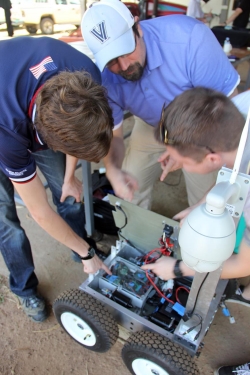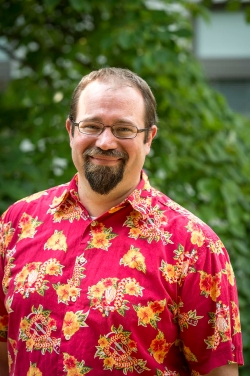Fortuitous Encounters Lead Faculty Member to Cambodia and a Fulbright Scholar Award

Chance encounters can be life-changing. Such has been the case for Villanova University’s Garrett Clayton, PhD, Associate Professor of Mechanical Engineering. For Dr. Clayton, a newly awarded Fulbright Scholar research/teaching grant resulted from a conversation four years earlier at the office copy machine, followed by a fortuitous meeting on a flight to Cambodia.
“I was making copies when Jordan Ermilio, director of Villanova Engineering Service Learning, came out of his office next to the copy machine, looking for a last-minute replacement to travel to Cambodia with him to identify projects at a rural elementary school. He asked me; I said yes, and three months later I was on a plane to Phnom Penh.” That flight proved to be equally well-timed. “On this plane ride, one of our students sat next to a Golden West Humanitarian Foundation employee. He invited us to visit their facility where we learned about GWHF’s position as a world leader in research and development for humanitarian mine action. Over dinner we decided to collaborate.”
Four years and five trips to Cambodia later, Dr. Clayton’s relationship with GWHF has grown to include senior design projects, a master’s thesis, and two ongoing doctoral projects on mechatronics and robotics for humanitarian mine action. In addition, he has started engaging with the Cambodian robotics community by co-organizing the Conference on Robotics in Cambodia.

“I have only scratched the surface of what I can do in Cambodia,” says Dr. Clayton when asked why he applied for the Fulbright Scholar Award. “I see so many opportunities to make an impact by leveraging the relationships and connections I have there, but I need an extended stay to accomplish these things.” Among his goals are strengthening the Cambodian robotics community, researching robotic solutions for minefield area reduction, teaching mechatronics—his area of expertise—at the Institute of Technology of Cambodia, and leading a teacher training workshop on active learning. “My time will be split 50/50 between teaching and research,” he explains.
Dr. Clayton’s four-month stay in the country will begin in April 2018. Meanwhile, work continues on an explosive ordnance disposal robot that has been the focus of Villanova’s relationship with GWHF since the two began collaborating in 2013.
